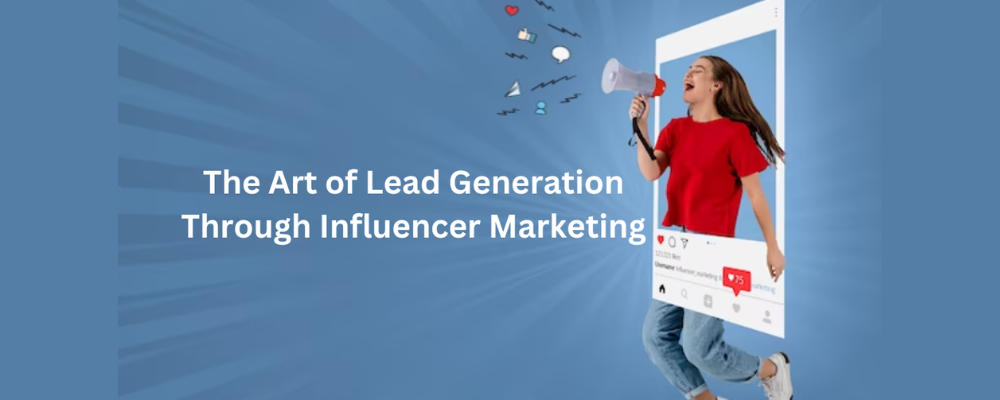In the current ever-changing digital environment, marketing strategies have experienced a significant change, with the influential realm of influencer marketing playing a central role in this shift. Once confined to celebrity endorsements, marketing strategies have pivoted toward leveraging the sway of influencers – individuals who wield immense credibility, authority, and reach within specific niches or communities. This shift signifies a fundamental change in how brands engage with their audience, embracing a more authentic, relatable, and nuanced approach.
Influencer marketing, at its core, harnesses the power of these influential personalities across social media platforms, weaving a narrative that resonates deeply with their dedicated followers. These influencers are not merely conduits for brand messaging; they personify an era where trust, authenticity, and genuine connections drive consumer behaviors. Their impact extends beyond conventional advertising methods, shaping purchasing decisions, trends, and fostering communities rooted in shared interests or values.
The Shift Towards Influencer-Driven Strategies
This seismic shift towards influencer-driven strategies stems from the contemporary consumer’s discerning nature – an audience weary of traditional advertising bombardment, seeking connection and relatability in the brands they engage with. Influencers, with their ability to foster organic conversations and cultivate genuine rapport, stand as linchpins in forging these connections. They possess the unique capability to humanize brands, infuse stories with authenticity, and weave narratives that seamlessly integrate with the fabric of their followers’ lives.
Moreover, influencers wield an unparalleled ability to navigate the labyrinth of social media algorithms, delivering content in a manner that bypasses the saturation of traditional marketing efforts. Their content feels less like an intrusive sales pitch and more like a recommendation from a trusted friend, creating an environment conducive to engagement and, crucially, to lead generation.
Importance of Influencers in Modern Marketing
In the grand tapestry of modern marketing, influencers aren’t merely additional assets; they are indispensable catalysts driving brand visibility, credibility, and, most notably, conversions. Their significance transcends follower counts; it resides in their capacity to spark conversations, inspire action, and ultimately, shape the trajectory of a brand’s success.
As the marketing landscape continues to evolve, the importance of influencers in steering brand narratives and spearheading lead generation strategies cannot be overstated. Their impact resonates far beyond the confines of a single campaign, signaling a pivotal chapter in the art of lead generation through the compelling medium of influencer marketing.

Defining Lead Generation in the Marketing Context
Lead generation constitutes the strategic process of capturing and cultivating consumer interest in a product or service with the ultimate goal of converting them into prospective buyers. It involves stimulating and capturing interest, often through various marketing initiatives, to gather information from potential customers, thus creating a pool of leads. These leads, individuals or entities showing interest, typically provide contact details or express interest in a product or service, indicating a readiness to explore further.
Types of Leads and Their Significance
Cold Leads: Individuals or businesses who haven’t shown direct interest but fit the demographic criteria. They require more nurturing before conversion.
Warm Leads: These leads have displayed some interest, possibly by signing up for newsletters, downloading resources, or showing intent in some form.
Hot Leads: The most promising category, displaying strong intent to purchase or engage. They might have actively reached out for product information or demonstrated immediate interest in buying.
The significance lies in categorizing and understanding leads’ behaviors, enabling tailored marketing strategies. Each type requires a distinct approach and level of engagement to progress them toward conversion.
The Role of Lead Generation in Business Growth
Lead generation serves as the lifeblood of business growth. It’s the foundation upon which sales pipelines are built. Effective lead generation strategies not only bolster sales but also contribute to brand visibility, market understanding, and customer relationships. By generating leads, businesses create opportunities to nurture relationships with potential customers, guiding them through the sales funnel. Successful conversion of leads into customers enriches the customer base, drives revenue, and ultimately fosters sustainable growth.
An efficient lead generation strategy isn’t merely about acquiring contacts; it’s about nurturing prospects, understanding their needs, and providing value that aligns with their interests. It’s the cornerstone of a thriving sales ecosystem, influencing not just immediate transactions but also fostering brand loyalty and advocacy.

Lead generation is not solely a precursor to sales; it’s a strategic process that aligns marketing efforts with customer needs, driving business growth by nurturing relationships and steering prospects toward conversion.
Leveraging Influencers for Lead Generation
Identifying the ideal influencers involves a strategic evaluation aligned with your brand’s ethos, target audience, and campaign objectives. Factors include:
- The influencer’s niche should align with your brand’s industry or target audience.
- Look beyond follower count; assess the influencer’s engagement rates, authenticity, and resonance with their audience.
- Ensure their values and content tone match your brand’s ethos for authentic collaboration.
- Review their past collaborations, success metrics, and impact on driving actions.
Strategies to Collaborate Effectively with Influencers
- Outline campaign objectives, expectations, and deliverables clearly.
- Craft partnerships ensuring value exchange for both the brand and the influencer.
- Encourage genuine, non-scripted content that aligns with the influencer’s style.
- Foster ongoing engagement beyond the campaign period to sustain audience interest.
- Establish clear metrics to measure success and adjust strategies accordingly.
Crafting Compelling Content for Lead Generation
- Encourage influencers to narrate authentic stories resonating with their audience’s aspirations or challenges.
- Offer value through informative, educational, or problem-solving content related to your brand.
- Integrate clear and compelling CTAs directing audiences to take desired actions.
- Encourage influencers to create content that involves their audience, fostering engagement and trust.
- Ensure content consistency across the influencer’s platforms and your brand’s messaging.

By effectively identifying the right influencers, establishing fruitful collaborations, and crafting compelling content, brands can leverage influencers as powerful conduits for lead generation. The key lies not only in amplifying reach but also in fostering genuine connections that resonate with the influencer’s audience, thus driving meaningful engagement and conversion.
Building Trust and Credibility
Influencers possess a unique ability to cultivate trust among their audience, often stemming from their authenticity, relatability, and consistent engagement. Their impact on trust is profound, as followers perceive them as peers rather than conventional advertisers. Through genuine interactions, transparent storytelling, and personal connections, influencers forge deep bonds of trust with their audience. This trust forms the bedrock upon which their recommendations and endorsements hold significant sway.
Collaborating with influencers offers brands an opportunity to tap into the trust reservoir they’ve built with their audience. By aligning with influencers whose values and beliefs resonate with the brand’s ethos, companies can leverage this existing credibility. It’s crucial to foster partnerships where influencers genuinely endorse the brand, product, or service, ensuring that endorsements feel natural and authentic. This authenticity bolsters the brand’s credibility in the eyes of the influencer’s audience, facilitating a smoother path towards lead conversion.
Authenticity is the cornerstone of influencer marketing’s success. When influencers authentically endorse a product or service, their audience perceives the recommendation as genuine and reliable. This authenticity significantly influences lead conversion. Influencers can effectively communicate the brand’s value proposition, addressing pain points, and demonstrating how the product or service aligns with their audience’s needs. This alignment between the influencer’s authentic endorsement and the brand’s offering plays a pivotal role in converting followers into potential leads.
Metrics and Measurement
Key metrics are pivotal in gauging the success of lead generation efforts. Click-Through Rate (CTR) measures the percentage of users showing interest by clicking on specific links. Conversion Rate tracks the percentage of users taking desired actions like signing up or making a purchase. Cost per Lead (CPL) calculates expenses per generated lead, offering insights into campaign efficiency. Engagement Metrics encompass likes, comments, and shares, reflecting audience interaction. Additionally, Lead Quality analysis considers demographics and behavior to assess leads’ value in the sales funnel.
When analyzing influencer marketing Return on Investment (ROI), various metrics come into play. ROI evaluates campaign effectiveness by comparing gained revenue against costs. Attribution Modeling dissects touchpoints contributing to lead generation, assigning value to each interaction. Lifetime Value (LTV) measures long-term value from acquired leads. Incremental Sales discern influencer-driven sales from other sources, highlighting campaign impact.

To measure success, employing diverse tools and techniques is crucial. Analytics Platforms like Google Analytics track website traffic and conversions. UTM Parameters monitor user behavior from influencer content. Affiliate Links and Promo Codes attribute conversions directly to influencers. Surveys and Feedback gather direct insights from leads, understanding their journey and preferences regarding influencer content.
Accurate measurement, in-depth ROI analysis, and varied measurement tools are vital in evaluating the effectiveness of influencer marketing for lead generation. These insights empower marketers to refine strategies and optimize influencer collaborations for maximum impact.
Overcoming Challenges
In influencer-driven lead generation, several challenges often arise, impacting campaign effectiveness. Authenticity concerns stand out as influencers endorsing numerous products may jeopardize their credibility, potentially eroding the trust of their audience. Finding the right fit, where influencers align perfectly with the brand, proves time-consuming and challenging. Accurately measuring Return on Investment (ROI), especially concerning lead generation, faces complexities due to attribution issues. Additionally, ensuring influencer-created content effectively conveys the brand message while authentically engaging their audience presents its own set of difficulties.
To overcome these hurdles and optimize results, strategies focused on authenticity and audience alignment are crucial. Building authentic collaborations fosters long-term relationships with influencers, ensuring genuine endorsements aligned with the brand. Thorough audience analysis aids in identifying influencers whose followers closely resemble the brand’s target audience, thereby increasing lead generation potential. Establishing clear campaign objectives and Key Performance Indicators (KPIs) centered around lead generation facilitates accurate success measurement and strategy adjustments. Diversifying influencer partnerships across tiers expands reach and amplifies lead generation possibilities among different audience segments. Leveraging advanced tracking tools and attribution models helps trace the customer journey, offering deeper insights into ROI.
Moreover, providing influencers with clear brand guidelines while allowing creative freedom fosters content that resonates authentically with their audience and aligns with the brand message. By addressing authenticity, audience alignment, measurement intricacies, and content relevance, brands can optimize influencer-driven lead generation. Strategic planning, authentic relationship building, and harnessing influencers’ strengths serve to mitigate challenges and maximize the impact of influencer collaborations on lead generation.
Conclusion
In the vibrant world of contemporary marketing, the mastery of generating leads through influencer marketing showcases a profound shift in how brands connect with their audience. The symbiotic bond forged between influencers and their dedicated communities transcends conventional marketing paradigms, breathing life into campaigns driven by authenticity, trust, and genuine connections. By harnessing the power of influencers to authentically engage audiences, brands not only amplify their reach but also foster meaningful relationships that fuel lead generation. As brands navigate this intricate realm, the strategic fusion of influencer partnerships, compelling storytelling, and data-driven insights serves as the compass guiding them toward the ultimate goal: transforming engagement into valuable leads. In this convergence of artistry and strategy, influencer marketing stands as a powerful conduit, redefining the landscape of lead generation and paving the way for a more engaging, authentic, and impactful marketing future.




